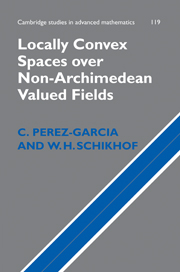Book contents
- Frontmatter
- Contents
- Preface
- 1 Ultrametrics and valuations
- 2 Normed spaces
- 3 Locally convex spaces
- 4 The Hahn–Banach Theorem
- 5 The weak topology
- 6 C-compactness
- 7 Barrelledness and reflexivity
- 8 Montel and nuclear spaces
- 9 Spaces with an “orthogonal” base
- 10 Tensor products
- 11 Inductive limits
- Appendix A Glossary of terms
- Appendix B Guide to the examples
- Notation
- References
- Index
8 - Montel and nuclear spaces
Published online by Cambridge University Press: 06 July 2010
- Frontmatter
- Contents
- Preface
- 1 Ultrametrics and valuations
- 2 Normed spaces
- 3 Locally convex spaces
- 4 The Hahn–Banach Theorem
- 5 The weak topology
- 6 C-compactness
- 7 Barrelledness and reflexivity
- 8 Montel and nuclear spaces
- 9 Spaces with an “orthogonal” base
- 10 Tensor products
- 11 Inductive limits
- Appendix A Glossary of terms
- Appendix B Guide to the examples
- Notation
- References
- Index
Summary
In this chapter we study the class of the so-called semi-Montel spaces and two important subclasses consisting of the nuclear spaces and the Montel spaces, respectively. We will see that for members of these classes the duality and reflexivity theory becomes more powerful and varied than for arbitrary spaces.
We first study compactoid operators (i.e., operators mapping some zero neighbourhood onto a compactoid set, 8.1.1) and compactifying operators (i.e., continuous operators that map bounded sets onto compactoids, 8.3.1). Compactoid operators are compactifying (8.3.2) but the converse does not hold (8.3.4). Basic properties of compactoid operators are listed in 8.1.3, the general form of a compactoid operator into c 0 is given in 8.1.9(ii). As an application we derive in 8.2.1 and 8.2.2 that, if the valuation of K is dense, there is no continuous linear surjection ℓ∞ → c0, and that ℓ∞ does not have a base. The general form of a compactifying operator into c 0 is given in 8.3.9.
In Section 8.4 we treat semi-Montel spaces E, i.e., for each normed space F each T ∈ L (F, E) is compactoid, 8.4.1(i); equivalently, for each normed space F each T ∈ L (E, F) is compactifying, 8.4.5(ε). It is also proved in 8.4.5(δ) that a space is semi-Montel if and only if each bounded set is a compactoid. For polar spaces (spaces of countable type) E we characterize semi-Montelness in terms of E′b in 8.4.8 (8.4.13). For this we provide a new characterization of compactoids in polar spaces (8.4.9). Hereditary properties of semi-Montel spaces and reflexive semi-Montel spaces, called Montel spaces (8.4.2), follow in 8.4.24, 8.4.25 and 8.4.26.
Information
- Type
- Chapter
- Information
- Locally Convex Spaces over Non-Archimedean Valued Fields , pp. 301 - 336Publisher: Cambridge University PressPrint publication year: 2010
